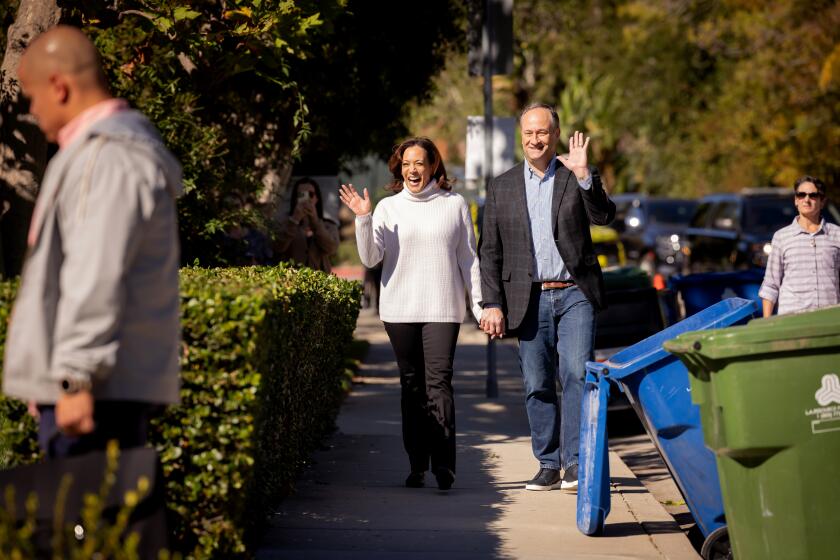The Last Thing That California’s Republicans Need
A loss of six GOP congressional seats in the 2000 election would switch control of the House of Representatives to the Democrats. It is not impossible that all the necessary Democratic gains can come from California, with the impeachment of President Bill Clinton acting as the catalyst. Last November, 21 House Republicans, among them six Californians, were elected or reelected with 53% of the vote or less. All backed impeachment. Third-term Rep. Brian P. Bilbray (R-San Diego), who won with only 49% of the vote, spearheads the GOP group.
There already is anecdotal evidence that impeachment will be an issue in some California races. The media have focused on the political risks facing GOP Reps. James E. Rogan (R-Glendale) and Tom Campbell (R-San Jose). Rogan, who emerged as one of the most dogged and vitriolic of the House managers, represents an increasingly Democratic district. Last November, he narrowly defeated, with 50% of the vote, an underfunded Democratic challenger in a race dominated by the impeachment issue. A post-election poll of San Gabriel voters, some of whom are Rogan constituents, indicated that only 24% of them wanted their representatives to vote for impeachment. A recent Democratic poll of Rogan’s own 27th district found only 34% of likely voters would reelect him.
Campbell, a moderate, won reelection handily, garnering 60% of the vote in a district whose GOP registration is 37%. But there are early signs of dissatisfaction with the three-term congressman over his impeachment vote. A group of Stanford University professors has organized Republicans Against Campbell, other local GOPers are switching parties and the Democrats are happily helping with “conversion registration days.” Even Campbell appears convinced impeachment will be an issue in his next campaign. “The opposition my vote has engendered,” he told a newspaper, “is by far the most I’ve ever received on one vote.”
The shaky Republicans share a brand name increasingly unpopular with California voters, who regard the GOP as dominated by mean-spirited, rigidly conservative white males out of step with, and unreflective of the general electorate. That impression cost California Republicans dearly in statewide and legislative races last year.
In his closing statement before the Senate, Rogan acknowledged that fallout from a bitter impeachment battle could further endanger GOP prospects. “The pundits keep telling me that my stand on this issue puts my political fortunes in jeopardy,” he mused. “So be it.” But the California Republican Party is in real trouble even without the danger of an impeachment backlash. Last November’s results starkly highlighted major structural problems that it must overcome to compete here.
First, the state’s demographics are changing: There are fewer Anglos and an increasing number of minorities, particularly Latinos. With these population shifts, the electorate’s voting patterns are changing. Voter registration for both major parties is down; however, Republican registration has decreased more dramatically. In 1990, 39% of registered Californians were Republicans. By 1998, that percentage had dropped to 35%. Decline-to-state registrations, on the other hand, are increasing.
The rapidly growing Latino electorate is signing up as Democrats or independents, thanks to the legacy of Pete Wilson and his party’s antiminority stances. Furthermore, last November’s exit polls also showed a decline in Anglo turnout and an increase in Latino and union voters, Democratic stalwarts. Non-Latino white voters backed the Democratic winner, Gray Davis, for governor over Republican contender Dan Lungren. “When a Republican candidate loses the white vote in this state,” Lungren pollster Dick Dresner told a recent UC Berkeley conference on the 1998 governor’s race, “we’ve lost our base.”
Exit polls also indicated California voters are moving toward the center; fewer identified themselves as conservatives and an increasing number said they are moderates. In surveys, Democrats fared better than Republicans on issues of concern to centrist voters.
Impeachment has underscored this issues disconnect between California’s electorate and the Republican Party base, just as it has intensified the cultural war eroding the GOP nationally. But an ever more bitter intraparty battle over abortion rights threatens the political resuscitation of California Republicans more than any other issue.
How much so may become clear when the state GOP meets later this month. An insurgent group of moderates, angered by the Republicans’ antiabortion position, is set to challenge the party’s proposed slate of conservative officers. A catalyst for the challenge was a newspaper interview in which John McGraw, the party’s vice chair and slated leader, said that “the most important issue” facing the party “by far is the abortion issue.”
Pragmatic Republicans realize that abortion is the issue that drove moderates and women away from GOP candidates for governor and U.S. Senate in 1998. David Puglia, Lungren’s campaign manager, told the UC Berkeley conference that it will be “very, very difficult” for Republican antiabortion candidates to win statewide. “This is a state that’s very nervous about religion and politics--more than any other state.”
Puglia’s observation has implications for the 2000 presidential campaign. A strong top-of-ticket candidate could be particularly important in the wake of an impeachment backlash. But one who is defined by social conservatism won’t work here. That’s why 25 California legislators sent Texas Gov. George W. Bush a letter urging him to run for president, a slap at Wilson and more ideological Republican contenders.
Democrat Dianne Feinstein’s Senate seat is also up in 2000. Campbell, a pro-choice moderate who lost the 1992 Senate primary, might look to cash in his pro-impeachment chits and run again. There is speculation that Rogan’s activism telegraphs a decision, or maybe a deal struck with party leaders, to leave Congress and run against Feinstein. With the GOP bench decimated in the 1998 debacle, Rogan could position himself to run for statewide office--attorney general, perhaps--in 2002. By then, a Democratic-controlled reapportionment would likely put the congressional seats of vulnerable Republicans at greater risk than any impeachment backlash.
The fallout from impeachment has created one sure problem for state Republicans. According to GOP consultant Allan Hoffenblum, “Impeachment has energized the Democratic recruitment process.” It may be easier to find strong candidates to run against vulnerable Republicans, especially among term-limited Democratic officeholders who want to escape enforced retirement.
Among possible challengers to Rogan are state Sen. Adam B. Schiff (D-Burbank) and Assemblyman Jack Scott (D-Pasadena). Bilbray could find himself opposed by term-limited Assemblywoman Susan A. Davis (D-San Diego), Campbell by former San Jose Mayor Susan Hammer. Steve Horn (R-Long Beach), could face Long Beach Mayor Beverly O’Neill or Councilman H. Delano Roosevelt.
Admittedly, this is an early handicapping of horse races not yet posted. The next general election is nearly two years off and state voters’ attention could shift to issues--or scandals--not now on the radar screen. But make no mistake. The way back to political competitiveness is difficult enough for California Republicans. The fallout from impeachment can only make the journey harder.*
More to Read
Get the L.A. Times Politics newsletter
Deeply reported insights into legislation, politics and policy from Sacramento, Washington and beyond. In your inbox three times per week.
You may occasionally receive promotional content from the Los Angeles Times.










